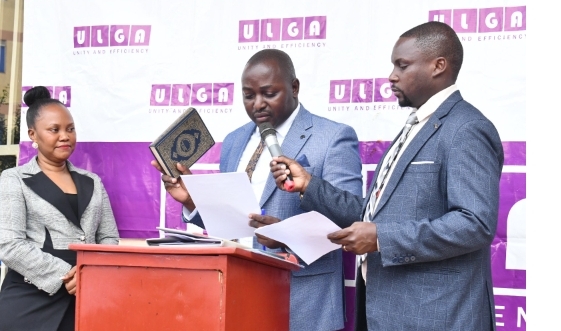On December 5, 2024, the Uganda Local Governments Association (ULGA) officially inaugurated its new Executive Committee at its National Headquarters in Najjanankumbi. Among the leaders sworn in was Ibrahim Kitatta, the Lwengo District Chairperson, now serving as the Regional Vice President for the Central Region. The induction retreat for the committee was held at Eureka Place Hotel in Ntinda.
The Chief Guest, Odrek Rwabwogo, Chairperson of the Presidential Advisory Committee on Exports and Industrial Development (PACEID), urged the new leaders to embrace a forward-thinking approach to leadership. Highlighting the importance of integrity and strategic planning, Rwabwogo encouraged them to develop a long-term vision focused on transforming communities.
“The success of your tenure will be determined by the courage to lead selflessly, uphold values, and work as trustworthy teams,” he said. He emphasized the need for collaboration across government institutions to meet the needs of citizens effectively.
Focus on Pressing Challenges
Kitatta, recently elected as ULGA Vice President for the Buganda Region, expressed a commitment to bridging the service delivery gap in local governments. He pledged to foster unity among leaders regardless of their political affiliations and address pressing issues affecting communities.
Speaking about the challenges local governments face, Kitatta cited inadequate funding, outdated infrastructure, and insufficient personnel in critical sectors such as education. He pointed out the dire need to improve primary schools, many of which struggle with overcrowded classrooms and a severe shortage of teachers.
“Our education system is under immense strain, with many schools unable to meet basic needs due to limited resources. This compromises the quality of education for children in rural areas, leaving parents to bear additional financial burdens,” Kitatta noted.
He also highlighted the poor state of rural roads and the lack of clean water systems, which have left many communities vulnerable to preventable diseases. Kitatta called for greater decentralization of services to empower local governments to provide essential services.
Advocacy for Local Leaders
Kitatta emphasized the need to prioritize the welfare of local government leaders, particularly as the country heads toward an election year. He raised concerns about the lack of resources for leaders to monitor government programs effectively, pointing out that many LC5 chairpersons have been operating without vehicles since their election in 2021.
“This situation not only hampers service delivery but also undermines the morale of leaders tasked with serving their communities,” Kitatta stated.
He committed to bringing these issues to the attention of key policymakers, including Members of Parliament and the NRM Central Executive Committee, to ensure they receive the President’s attention.
A Vision for Inclusive Leadership
Kitatta reiterated his vision for unity and inclusivity, emphasizing the need to represent all citizens, regardless of their background or political affiliation. He acknowledged the political divisions within the central region but called on leaders to put aside their differences to focus on improving service delivery.
“We have a responsibility to work together and address the challenges facing our communities. It is only through unity and collaboration that we can create lasting change,” Kitatta said.
As he takes on his new role in ULGA, Kitatta is determined to ensure that the voices of local governments are heard at the national level, advocating for policies that support development and improve the quality of life for all Ugandans.
![]()
























